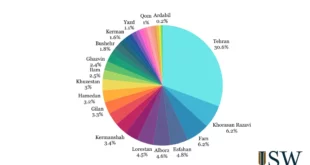RAMALLAH — Eighth-grader Thaer Shweikiyeh, who dreams of being a doctor one day, was excited about going back to school after the summer vacation. Instead, he’s been selling onions in the local farmers’ market for the past two months, and his new schoolbag remains untouched.
Thaer is one of 800,000 Palestinian students locked out by an open-ended teachers’ strike, called over the Hamas-led government’s failure to pay salaries to 165,000 civil servants since it came to power in March.
A quick end to the strike appears unlikely.
Squeezed by an international aid boycott, the rulers have no money to pay the teachers.
But Hamas says there’s much more behind the walkout than a wage dispute: They accuse the rival Fateh movement, which dominates the teachers’ unions, of keeping the strike going to try to bring down the government.
In this standoff, it appears increasingly likely Palestinian students will lose the entire school year — a blow to a society already weary from growing internal strife, economic depression and years of Israeli travel bans.
Many Palestinians put a premium on education as a means of survival — a response to their turbulent history of uprooting and exile — and parents are increasingly worried about their children’s future.
Educators fear many 12th graders may not be able to graduate next spring, even though some teachers are holding informal classes for the seniors.
Most of the students now spend their days watching TV, hanging out in Internet cafes or pool halls late into the night, or working in their parents’ businesses.
The exceptions are about 300,000 attending private schools and those funded by the UN in refugee camps.
The strike is reminiscent of the Israeli-imposed school closures during the first Palestinian uprising, from 1987-1993, when students would miss months of school at a time. Many of that generation say they still have large gaps in their education that they have been unable to fill as adults.
Parents are divided over whether to blame the government or the teachers.
Shopkeeper Omar Abu Hamda, 42, a father of five, said the teachers have a responsibility to their students and must get back to their classrooms.
Driving instructor Jawad Abul Sheikh, 38, also a father of five, said the government should step down. “The whole region is standing against them, not only Israel and the West,†he said of the Hamas rulers.
Education Minister Nasser Shaer of Hamas called the strike a “national catastrophe.†An educated labour force is one of the Palestinians’ few resources. The West Bank and Gaza have one of the highest literacy rates in the Arab world, and Palestinian professionals hold key positions in wealthy Gulf economies, often supporting families back home.
Shaer said he is appealing to the Arab world to help pay the teachers’ salaries. In the meantime, he said, the teachers must return to work.
But educators said they will not keep working for free.
“We were left unable to feed our families,†said Muzied Ali, a 47-year-old English teacher at a village high school near Jerusalem.
Bassem Hadaideh, spokesman of the civil servants union, said the strike — which currently includes some 40,000 teachers and 15,000 healthcare workers — would be broadened if the government doesn’t pay up.
Some of the 80,000 members of the security forces could soon walk out, he said. The men in uniform are on the job for now, but have staged protests from time to time. One of these protests ignited clashes with Hamas fighters that left 12 dead and dozens injured in Gaza earlier this month.
Hamas and Fateh gunmen have tried to settle the dispute by force, clashing in the West Bank towns of Nablus and Tulkarem over whether schools should be open or shut down.
Teachers have been threatened by gunmen from both sides.
Teachers with Hamas loyalties have largely kept working, trying mainly to help the high school seniors. In the town of Anata near Jerusalem, five of 18 teachers are giving three classes a day.
But that may not be enough to graduate, said Rami Hamdallah, head of An Najah University in the West Bank city of Nablus. He expects the incoming class of An Najah students to shrink by 25 per cent.
Thaer, the aspiring doctor, said he misses school, but in the meantime has to put in 12-hour days to make money for his family. On a recent morning, the 14-year-old had no luck selling bunches of fresh green onions outside a neighbourhood mosque, but said he’d try again later in the day.
One of Thaer’s co-workers, 17-year-old Ziad Jumma, said he feels out of place in the market.
“I’m so tired of being here,†he said as he pushed a cart loaded with a customer’s produce. “Yesterday, I told my family if the government schools don’t open, I’ll look for a private school.â€
 Eurasia Press & News
Eurasia Press & News


